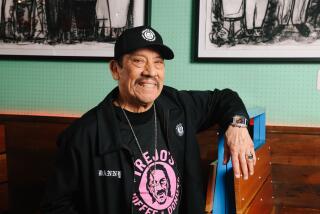Danny Trejo, a lethal talent
For a man who’s so stone-faced on the screen, Danny Trejo sure has a lot to say.
Standing up at a banquette inside the classic Hollywood restaurant Musso & Frank on a recent afternoon, Trejo tells an elderly man hovering uncertainly in the doorway to “come on in,” imitates director Robert Rodriguez’s text-happy fingers, gestures to the waiter for a refill of his cranberry and 7-Up (“Manny, another one!”) and turns to a reporter to decry the flaws in the California prison system before offering some culinary advice (“You’ve never had the eggs Benedict here? You gotta have them!”). Then, he follows said reporter into the restroom, where the business at hand does little to stop Trejo’s riff about the time his then-9-year-old-son greeted Robert De Niro with a “Taxi Driver” imitation. (“I said ‘Mi hijo, how do you know that movie?’ ”)
Welcome to the world of Hollywood’s toughest bad guy — or possibly its biggest social butterfly?
For more than two decades, audiences have watched Trejo play a litany of men you wouldn’t want to meet in a dark alley, characters such as El Jefe, Jumpy and Hoodlum No. 2. But when he’s not starring as the requisite roughneck, Trejo cultivates a different image. The former San Quentin inmate is, after a fashion, a political activist, a neighborhood guy, a mainstay of old-school Hollywood (he eats at Musso & Frank once or twice a week), a 12-step poster-child and motivational speaker, and last but undoubtedly not least, a man Mexican rock bands write songs about.
“I was doing radio interviews and all of them were asking me about my song,” he says, referencing a track about him from Monterrey rock band Plastilina Mosh. “I’m like, ‘Come on. I’ve gone from ex-con to icon.’ ”
Trejo adds a more substantial notch to his film résumé this weekend with “Machete,” Robert Rodriguez’s immigrant satire-cum-exploitation film. Here, for a change, the actor plays the title character and the hero, the Latino legend of the over-enunciated title (“Mach” as in “Macho,” then the airless Spanish ‘T,’ then an “ete” that rhymes with “sensei”). A mythic, abstract force as much as full-blown character, Machete can pulverize baddies with little more than the flick of his wrist while making hotties like Michelle Rodriguez and Jessica Alba fall into bed with him with barely a head nod.
In a Texas racked by immigrant fears, Machete is framed for attempting to assassinate a political leader (De Niro), and then must exact revenge on those who set him up, all while his outlaw reputation provides hope to the embattled Latino population.
“It’s an honor to be the first Latino superhero,” says Trejo about a character Rodriguez conceived of more than 15 years ago and who began on-screen life as a fake trailer in “Grindhouse,” the director’s 2007 love letter to exploitation movies that he helmed with Quentin Tarantino. “And I didn’t have to wear tights, and I didn’t have a Daddy-hates-me complex,” Trejo adds, bursting into laughter.
The 66-year-old’s legend off screen is almost as rich as his new role. As a teenager and early twentysomething, he shuttled between prison and Southern California barrios. After he was blamed for a prison riot, he was sent to solitary, a period that inspired a dedication to boxing and to an alcohol- and drug-free life.
“I remember 10 or 15 years ago everyone talking about the millennium and being all worried. And I would say ‘The millennium? I wasn’t supposed to get out of the ‘60s.’ ”
In 1985, Trejo’s life was working as a substance-abuse counselor spiritually far from Hollywood when he ended up getting counseling work on the set of Andrei Konchalovsky’s “Runaway Train.” Konchalovsky spotted him, liked his leathery face, and gave him a role. A quarter of a century later, the actor has starred in seemingly every third Hollywood action movie including “Heat,” “Con Air” and numerous Robert Rodriguez films (in which his character is almost always named for a weapon). Trejo averages — averages — between 10 and 13 movies per year, often showing up on set for a few days, plying his villainous trade and leaving. He does that so often he frequently doesn’t remember the film’s director, or its title.
“Acting for me is like being a contractor or a plumber or a house painter. I don’t distinguish what house I’m gonna paint. Just ‘cuz I’m not getting as much money for this house I still have to do a good job,” he says, in slightly accented English, describing his attitude toward his earlier character parts. “I was Inmate No. 1 for five years [early] in my career. And I was the best Inmate No. 1 they ever had.”
Trejo can no longer perform action scenes as fluidly as he once did. But age has somehow made him tougher, the lines that crisscross his weather-beaten face suggesting deals he’s commandeered, cops he’s outsmarted, men he’s killed (on screen). In “Machete” his face is his best weapon, his silence instilling fear.
Trejo’s costar Michelle Rodriguez recalls being scared of the actor — at first. “He’s so imposing physically to look at. I was a little afraid of him,” says the actress, who’s not someone one imagines is easily cowed. “But then you meet him and it’s like there’s a child inside.
“He’s so pure,” she adds, referring to the first time she saw him playing with Alba’s 2-year-old daughter on set, or handing out Gatorade on his days off.
There is something cuddly about Trejo — even with the mustache and numerous tattoos, he can feel like a puppy who just wants to be around people. The Arleta, Calif.-based actor stays close to his working-class roots, visiting his elderly mother several times a week or dispatching one of the consiglieri he travels with — “Max and Mario and some other guys” — to visit her too. (Sometimes the neighbors get scared and call the cops, but he reassures them it’s OK.)
Trejo loves seeing movies as much as loves acting in them, though his viewing tastes run pretty much to the movies he’d star in. “My kids” — he has three children, ranging in age from 20 to 29, all from relationships before his current wife — “when they go see a movie, they’ll tell me what movies to watch. They’ll say, ‘Dad, don’t see this.’ They know if it’s too mushy or too slow or too much thinking” — he laughs — “I’ll start bothering people around me. There was a movie they told me not to see: ‘Where the Wild Things Go,’ I think it was called?”
The conversation veers to “Eat Pray Love,” which has just come out and seems, as a reporter mentions, not the kind of movie Trejo would be starring in as the role of, say, the medicine man. “Yes, I don’t see that either,” he says, laughing. “Actually, wait a minute. I did play a medicine man.” He tries to remember. “I forget the name. Was it — no, the other one. I think it was the one with Jean-Claude Van Damme.”
More to Read
Only good movies
Get the Indie Focus newsletter, Mark Olsen's weekly guide to the world of cinema.
You may occasionally receive promotional content from the Los Angeles Times.











